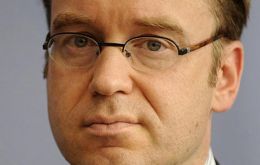MercoPress. South Atlantic News Agency
Tag: Germany
-
Tuesday, June 7th 2011 - 00:55 UTC
EU aid for farmers hurt by fresh produce slump triggered by E-coli outbreak

European Union farm ministers will try on Tuesday to agree financial aid for fruit and vegetable producers whose sales have been hit by an E.coli outbreak that has so far claimed at least 22 lives in Europe and triggered a scare in fresh produce consumption.
-
Tuesday, May 31st 2011 - 08:18 UTC
Germany plans to shut all nuclear reactors by 2022 and double renewable energy to 35%

Germany plans to shut all nuclear reactors by 2022, Chancellor Angela Merkel's ruling coalition announced Monday, in a policy reversal drawn up in a rush after the Fukushima disaster in Japan.
-
Tuesday, May 3rd 2011 - 04:59 UTC
New German central bank chief promises continued “stability culture”

Germany’s Bundesbank new hawkish president Jens Weidmann said private investors should help cover costs of the Euro zone crisis. Mr Weidmann promised a continued “stability culture” at the German central bank after taking over from outgoing president Axel Weber.
-
Tuesday, April 12th 2011 - 03:57 UTC
Germany and US leading global recovery with ‘robust expansion’, says OECD

The growth outlook for major industrialized economies is improving with Germany and the United States leading the recovery, the OECD's leading indicator for February showed.
-
Tuesday, April 12th 2011 - 03:51 UTC
German Literature Nobel Prize Guntther Grass warns of an “eco-dictatorship”

German Nobel Prize winner Gunther Grass fears that the nuclear disaster in Japan and other environmental issues could lead to an “eco-dictatorship”, according to an interview published in the “Haumburger Abenbdblatt”.
-
Monday, March 28th 2011 - 01:00 UTC
Fukushima thrashes Merkel; German Greens to appoint their first state premier ever

The Fukushima syndrome hit hard in Germany for Chancellor Angela Merkel's ruling coalition that suffered bruising losses in two state legislative elections Sunday, losing control of the main prize, Baden-Wuerttemberg state.
-
Wednesday, March 16th 2011 - 01:23 UTC
State elections behind Merkel’s decision to halt 7 of Germany’s 17 nuclear reactors

German Chancellor Angela Merkel is backtracking on nuclear power as the atomic emergency in Japan becomes an issue in state-election campaigns. Merkel’s decision to halt seven of Germany’s 17 reactors includes two in Baden-Wuerttemberg, where her party is battling to retain its 59-year-hold on the state in a March 27 vote.
-
Monday, February 14th 2011 - 15:46 UTC
Germany opposed to ECB buying sovereign bonds from indebted members

Germany's hopes for the next European Central Bank (ECB) chief to be a German have been hit after another possible candidate ruled himself out of the job. Ex-finance minister Peer Steinbrueck said he was not interested in the role as he shared the same views as outgoing Bundesbank President Axel Weber.
-
Tuesday, February 8th 2011 - 18:16 UTC
German cadet death that triggered “mutiny” in training ship was “unfit for duty”

The 25-year-old female cadet who died after falling from rigging on the German training ship Gorch Fock was unfit for duty because of her weight, according to German media reports on Tuesday.
-
Tuesday, January 11th 2011 - 22:00 UTC
Germany knew in 1952 Nazi Adolf Eichmann was hiding in Argentina

The notorious Nazi Adolf Eichmann could have been caught sooner if Germany's intelligence agency had assisted, new information has revealed. The German Information Agency knew as early as 1952 that Eichmann, a chief organizer of the Nazi genocide against the Jews, was hiding in Argentina under a false name, the German tabloid Bild reported.
